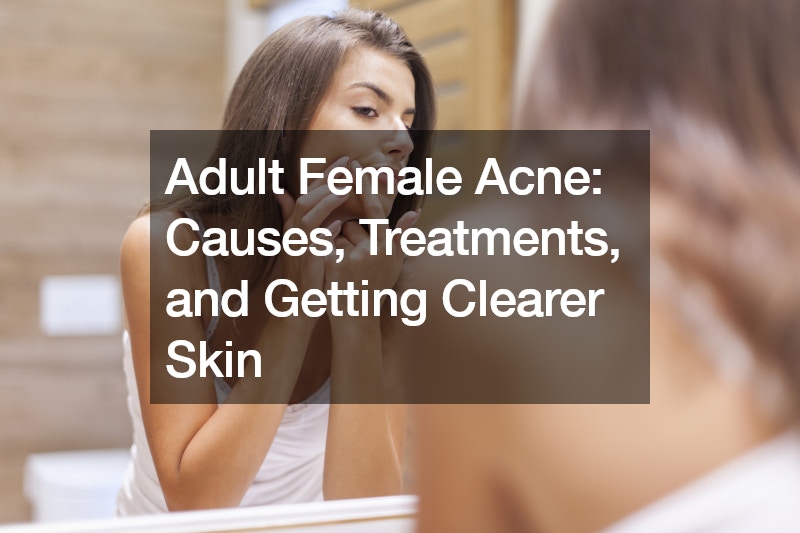Disclaimer: Mladysrecords. This site provides fashion and lifestyle content for informational purposes only.
Many women believe they’ll leave acne behind in their teenage years, but for a significant portion, breakouts persist well into adulthood. This can be frustrating and lead to a decline in self-esteem. Adult female acne, a common skin condition, affects millions of women over 25. Unlike teenage acne, which often presents as whiteheads and blackheads, adult female acne tends to be more stubborn and cystic.
Understanding the causes of adult female acne is the first step to achieving clearer skin. Hormonal fluctuations are a major culprit.
The menstrual cycle, pregnancy, and perimenopause can all trigger breakouts. Androgen hormones, present in both men and women, stimulate oil glands in the skin. During hormonal shifts, these glands can go into overdrive, producing excess oil that clogs pores and creates the perfect environment for bacteria to thrive. This bacteria leads to inflammation and, ultimately, pimples.
Other factors can also contribute to adult female acne. Genetics play a role, with a family history of acne increasing your risk. Diet can be an influencer, with sugary and processed foods potentially worsening breakouts. Stress, a constant companion in modern life, can also exacerbate acne. Additionally, certain medications, like birth control pills with high androgenic properties, can contribute to breakouts for some women.
The good news is that adult female acne is treatable. By addressing the underlying causes and implementing a consistent skincare routine, you can achieve clearer, healthier skin.
A dermatologist can recommend a personalized treatment plan based on the severity and type of your acne. Facial treatments for acne typically involve a combination of topical medications and, in some cases, oral medications.
Topical Treatments: These are applied directly to the skin and are often the first line of defense against acne.
- Benzoyl peroxide: This medication helps kill bacteria and reduce inflammation. It can be drying, so it’s important to use a gentle moisturizer alongside it.
- Retinoids: These come in over-the-counter and prescription strengths and help unclog pores and promote cell turnover. Retinoids can increase sun sensitivity, so sunscreen is crucial when using them.
- Azelaic acid: This multi-tasking ingredient has antibacterial and anti-inflammatory properties. It can also help lighten hyperpigmentation left behind by acne.
- Salicylic acid: This beta hydroxy acid helps exfoliate the skin and can be beneficial for mild acne with whiteheads and blackheads.
Oral Medications: For moderate to severe acne, oral medications may be necessary. Two common options are:
- Birth control pills: Certain birth control pills can help regulate hormones and reduce androgen levels, leading to fewer breakouts. However, birth control pills are not suitable for everyone, and it’s important to discuss your options with a doctor.
- Spironolactone: This medication is often prescribed for women with hormonal acne. It works by blocking the androgen receptors in the oil glands, preventing them from being stimulated by hormones.
Lifestyle Changes for Clearer Skin
In addition to facial treatments for acne, some lifestyle changes can support your skin’s health and potentially reduce breakouts.
- Diet: While there’s no single “acne diet,” some studies suggest a link between high-glycemic index foods (sugary drinks, refined carbohydrates) and acne. Consider reducing your intake of these foods and focusing on a balanced diet rich in fruits, vegetables, and whole grains. Some research also suggests a link between dairy consumption and acne. Experimenting with a dairy-free diet for a few weeks may be helpful in identifying if dairy is a trigger for you.
- Stress Management: Chronic stress can worsen acne. Techniques like yoga, meditation, and deep breathing can help manage stress and potentially improve your skin.
- Sunscreen: Sun exposure can irritate acne and lead to hyperpigmentation. Always wear a broad-spectrum sunscreen with SPF 30 or higher, even on cloudy days.
- Gentle Skincare Routine: Wash your face twice daily with a gentle cleanser and lukewarm water. Avoid harsh scrubs and rubbing your skin, which can irritate it and worsen acne.
- Don’t Pick!: It’s tempting to pick at pimples, but resist the urge. Picking can lead to scarring and worsen your acne.
Beyond the Basics:
While the tips above are fundamental, there are additional considerations for managing adult female acne:
- Cosmetics: Choose non-comedogenic makeup products that won’t clog pores. Look for labels that say “oil-free” or “non-acnegenic.” It’s also important to remove all makeup thoroughly before bed.
- Sleep: Aim for 7-8 hours of quality sleep each night. During sleep, your body repairs itself, including your skin.
- See a Dermatologist: A dermatologist is a doctor who specializes in skin conditions. They can diagnose your acne, determine the underlying cause, and develop a personalized treatment plan. They can also perform procedures like extractions for stubborn pimples and chemical peels for acne scarring.
Conclusion
Adult female acne is a common skin condition that can be effectively managed with the right approach. By understanding the causes, implementing a consistent skincare routine, and making some lifestyle changes, you can achieve clearer, healthier skin. Remember, be patient, manage your expectations, and focus on progress, not perfection. With a little effort and the help of a dermatologist if needed, you can gain control of your acne and feel more confident in your own skin.
.


